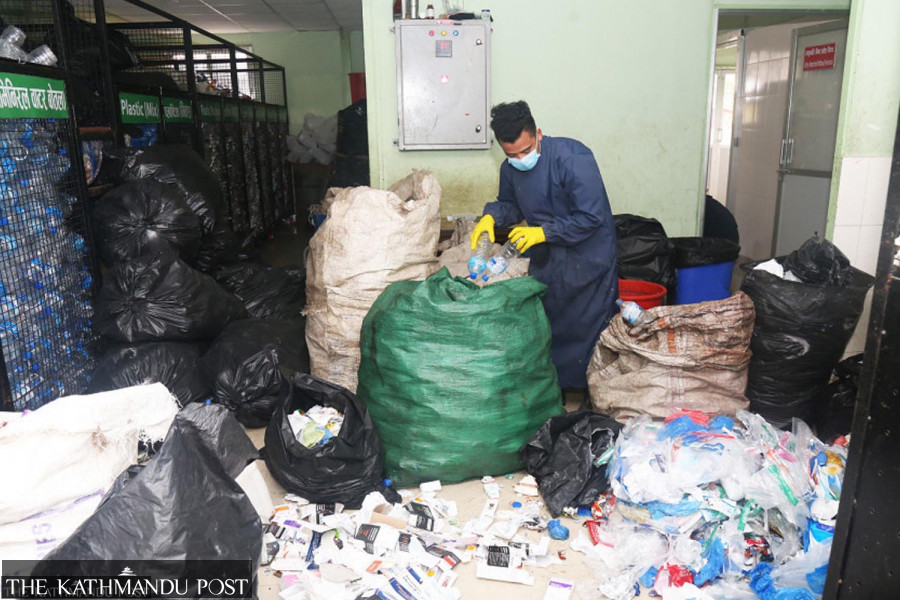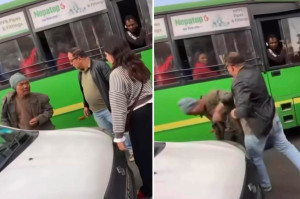Kathmandu
City removes garbage from core areas for Gaijatra, but lasting solution not in sight
Garbage transport to Banchare Danda landfill remains halted since Tuesday after lorries were vandalised. Drivers in protest demanding action against vandals.
Anup Ojha
The sole agenda of the seventh executive meeting of the Kathmandu Metropolitan City on Thursday was garbage collection, which remains disrupted since Tuesday after several garbage trucks were vandalised near the Dhading-Nuwakot border on Monday night.
According to the Environment Department of the Kathmandu Metropolitan City; in the dark of the night, two bulldozers, one excavator and 14 tipper trucks were vandalised by an unknown gang, which KMC officials suspect had political connections.
Mayor Balendra Shah informed the meeting that the Home Ministry is working to book those involved in the vandalism. But no one had been arrested until Friday evening.
“We are working on a plan to take less garbage to Banchare Danda as we are looking for places within Kathmandu to set up factories to produce manure from waste,” said Sunil Lamsal, an engineer and waste management consultant, who also works as secretary at the mayor's office.
“There are some people in the Sisdol area who want to politicise and profit from Kathmandu’s waste management problem and they are the ones involved in creating obstructions in garbage disposal and Monday’s vandalism,” said Lamsal.
Garbage disposal at Banchare Danda sees more disruptions especially during the monsoon owing to the poor road, which becomes impassable after heavy rains, besides frequent protests by locals.
Last month, garbage collection was halted for several days to repair the rain-damaged Sisdole-Banchare Danda road section.
In July second week, after being unable to transport solid waste from the Teku transfer station, the City covered the huge mounds of waste at the station with plastic tarps.
Balendra Shah, an independent candidate, was elected new mayor of Kathmandu on May 26. On the first day of his office, he announced that his top priority would be waste management, which has remained a perennial problem for the past two decades, and visited the Sisdole and Banchare Danda areas several times and spoke to the locals. The authorities and the locals also signed agreements whereby the government would address their pressing demands and they would halt protests and obstructions. But protests resumed after a few days and then came the rains.
At Thursday’s meeting of the City, local officials decided to clear the garbage overnight from the core areas of Kathmandu for Friday’s Gaijatra, which is a major festival in the Valley.
Conservationists and heritage activists thanked the City for the stopgap measure but stressed the need for finding a lasting solution. “At least the City removed garbage from the core areas including the temple areas and inner roads that are used by Gaijatra processions, but they must find a long-term solution,” said Ganapati Lal Shrestha, a heritage activist.
“Since it is a huge problem inherited by the mayor from his predecessors, he should tackle the problem by developing a strategic plan,” said Shrestha.
The garbage transfer station at Teku that sprawls over 45 ropani of land is currently full of garbage.
Bal Krishna Maharjan, ward chairperson of 12 where the transfer station falls said, the residents of Teku are living with the unbearable stench of rotting garbage for the past several weeks. Earlier, on May 17, Teku residents had protested against huge garbage buildup at the waste transfer station.
According to Sarkardeep Shrestha, the in-charge of the garbage transfer station, on a normal day over 150 lorries transfer Kathmandu garbage to Banchare Danda but this has stopped since last week after the garbage trucks were vandalised.
“Maybe we can resume garbage transfer from Saturday, but lorry drivers themselves are in protest demanding action against those involved in vandalism,” said Shrestha.
Lamsal, the engineer, says garbage management falls under essential services, which should not be obstructed under any circumstances. “The Home Ministry should nab the culprits and ensure smooth operation of garbage vehicles.”
Kathmandu Valley generates a total of 1,200 metric tonnes of solid waste, of which 60 percent is generated from Kathmandu Metropolitan City alone.




 18.12°C Kathmandu
18.12°C Kathmandu.jpg)











